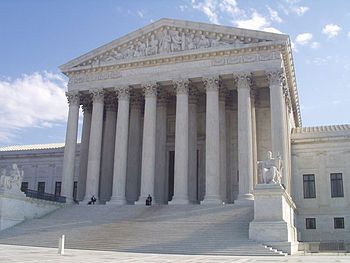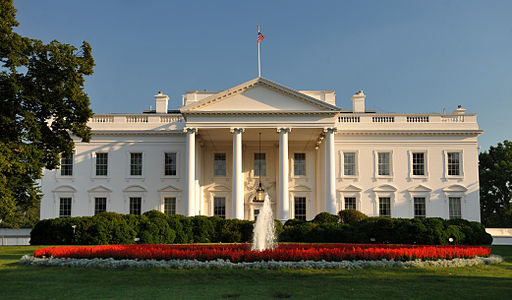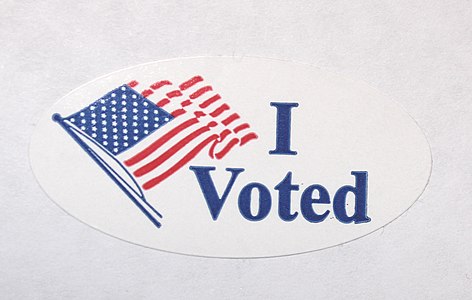Ballot access for major and minor party candidates
|
|
Ballot access for major and minor party candidates |
|---|
| Ballot access for presidential candidates |
| List of political parties in the United States |
| Methods for signing candidate nominating petitions |
| Ballotpedia's Election Administration Legislation Tracker |
Note: This article is not intended to serve as an exhaustive guide to running for public office. Individuals should contact their state election agencies for further information.
|
In order to get on the ballot, a candidate or party must meet a variety of state-specific filing requirements and deadlines. These regulations, known as ballot access laws, determine whether and how a candidate or party can appear on an election ballot. These laws are set at the state level and apply to state and congressional candidates.
There are three basic methods by which an individual may become a candidate for office in a state.
- An individual can seek the nomination of a state-recognized political party.
- An individual can run as an independent. Independent candidates often must petition in order to have their names printed on the general election ballot.
- An individual can run as a write-in candidate.
For state-specific ballot access requirements, select a state from the map below. If on a mobile device, select a state from the dropdown menu below.
For additional information about ballot access requirements for presidential candidates, see this article.
Ballot access in 2024
The table below lists statewide candidate filing deadlines and primary dates in 2024.
| Primary dates and filing deadlines, 2024 | ||||
|---|---|---|---|---|
| State | Primary date | Primary runoff date | Filing deadline for primary candidates | Source |
| Alabama | 3/5/2024 | 4/16/2024 | 11/10/2023 | Source |
| Alaska | 8/20/2024 | N/A | 6/1/2024 | Source |
| Arizona | 8/6/2024 | N/A | 4/8/2024 | Source |
| Arkansas | 3/5/2024 | 4/2/2024 | 11/14/2023 | Source |
| California | 3/5/2024 | N/A | 12/8/2023 | Source |
| Colorado | 6/25/2024 | N/A | 3/19/2024 | Source |
| Connecticut | 8/13/2024 | N/A | 6/11/2024 | Source |
| Delaware | 9/10/2024 | N/A | 7/9/2024 | Source |
| Florida | 8/20/2024 | N/A | 4/26/2024[1] | Source |
| Georgia | 5/21/2024 | 6/18/2024 | 3/8/2024 | Source |
| Hawaii | 8/10/2024 | N/A | 6/4/2024 | Source |
| Idaho | 5/21/2024 | N/A | 3/15/2024 | Source |
| Illinois | 3/19/2024 | N/A | 12/4/2023 | Source |
| Indiana | 5/7/2024 | N/A | 2/9/2024 | Source |
| Iowa | 6/4/2024 | N/A | 3/15/2024[2] | Source |
| Kansas | 8/6/2024 | N/A | 6/3/2024 | Source |
| Kentucky | 5/21/2024 | N/A | 1/5/2024 | Source |
| Louisiana | 11/5/2024 | N/A | 7/19/2024 | Source |
| Maine | 6/11/2024 | N/A | 3/15/2024 | Source |
| Maryland | 5/14/2024 | N/A | 2/9/2024 | Source |
| Massachusetts | 9/3/2024 | N/A | 5/7/2024 | Source |
| Michigan | 8/6/2024 | N/A | 4/23/2024 | Source |
| Minnesota | 8/13/2024 | N/A | 6/4/2024 | Source |
| Mississippi | 3/12/2024 | 4/2/2024 | 1/12/2024 | Source |
| Missouri | 8/6/2024 | N/A | 3/26/2024 | Source |
| Montana | 6/4/2024 | N/A | 3/11/2024 | Source |
| Nebraska | 5/14/2024 | N/A | 3/1/2024[3] | Source |
| Nevada | 6/11/2024 | N/A | 3/15/2024[4] | Source |
| New Hampshire | 9/10/2024 | N/A | 6/14/2024 | Source |
| New Jersey | 6/4/2024 | N/A | 3/25/2024 | Source |
| New Mexico | 6/4/2024 | N/A | 2/6/2024[5] | Source |
| New York | 6/25/2024 | N/A | 4/4/2024 | Source |
| North Carolina | 3/5/2024 | 5/14/2024 | 12/15/2023 | Source |
| North Dakota | 6/11/2024 | N/A | 4/8/2024 | Source |
| Ohio | 3/19/2024 | N/A | 12/20/2023 | Source |
| Oklahoma | 6/18/2024 | 8/27/2024 | 4/5/2024 | Source |
| Oregon | 5/21/2024 | N/A | 3/14/2024 | Source |
| Pennsylvania | 4/23/2024 | N/A | 2/13/2024 | Source |
| Rhode Island | 9/10/2024 | N/A | TBD | Source |
| South Carolina | 6/11/2024 | 6/25/2024 | 4/1/2024 | Source |
| South Dakota | 6/4/2024 | 7/30/2024 | 3/26/2024 | Source |
| Tennessee | 8/1/2024 | N/A | 4/4/2024 | Source |
| Texas | 3/5/2024 | 5/28/2024 | 12/11/2023 | Source |
| Utah | 6/25/2024 | N/A | 1/8/2024 | Source |
| Vermont | 8/13/2024 | N/A | 5/30/2024 | Source |
| Virginia[6] | 6/18/2024 | N/A | 4/4/2024 | Source |
| Washington | 8/6/2024 | N/A | 5/10/2024 | Source |
| West Virginia | 5/14/2024 | N/A | 1/27/2024 | Source |
| Wisconsin | 8/13/2024 | N/A | 6/3/2024 | Source |
| Wyoming | 8/20/2024 | N/A | 5/31/2024 | Source |
Court cases
Below is a listing of court cases relevant to ballot access law. These are listed in chronological order.
Williams v. Rhodes
- See also: Williams v. Rhodes
Decided by the Supreme Court of the United States in 1968, Williams v. Rhodes held that state laws regulating the selection of presidential electors must meet the requirements of the Equal Protection Clause of the Fourteenth Amendment of the United States Constitution.[7]
Bullock v. Carter
- See also: Bullock v. Carter
Decided by the Supreme Court of the United States in 1972, Bullock v. Carter held that the Texas primary filing fee system, which required the payment of fees as high as $8,900, violated the Equal Protection Clause of the Fourteenth Amendment of the United States Constitution. The court found that, under this system, "many potential office seekers lacking both personal wealth and affluent backers are, in every practical sense, precluded from seeking the nomination of their chosen party, no matter how qualified they might be and no matter how broad or enthusiastic their popular support."[8][9]
Lubin v. Panish
- See also: Lubin v. Panish
Lubin v. Panish, decided by the Supreme Court of the United States in 1974, held that, absent alternative means of ballot access, states cannot require indigent candidates to pay filing fees they cannot afford. To do so violates the Equal Protection Clause of the Fourteenth Amendment, as well as the rights of expression and association guaranteed by the First and Fourteenth Amendments of the United States Constitution.[10]
Storer v. Brown
- See also: Storer v. Brown
Storer v. Brown, decided by the Supreme Court of the United States in 1974, upheld as constitutional a California law forbidding ballot access to independent candidates who had been registered with a qualified political party within one year prior to the immediately preceding primary election. The ruling also established a test to gauge the level of burden imposed by signature requirements: if the number of signatures required is divided by the number of eligible signers and the resulting percentage is greater than five percent, the requirement is likely unconstitutional.[11]
Illinois v. Socialist Workers Party
Decided by the Supreme Court of the United States in 1979, the ruling in Illinois State Board of Elections v. Socialist Workers Party rendered unconstitutional an Illinois statutory requirement that new political parties and independent candidates for elections in political subdivisions (specifically, Chicago) gather more than the number of signatures required for elections for statewide office.[12]
Anderson v. Celebrezze
- See also: Anderson v. Celebrezze
Anderson v. Celebrezze, a case decided by the Supreme Court of the United States in 1983, held that Ohio's early filing deadline for independent presidential candidates violated the First and Fourteenth Amendments of the United States Constitution, placing an unconstitutional burden on the voting and associational rights of supporters of independent presidential candidates.[13][14]
Norman v. Reed
- See also: Norman v. Reed
Decided by the Supreme Court of the United States in 1992, Norman v. Reed held that it was unconstitutional for Illinois to require a new political party and its candidates to gather more than 25,000 signatures (the threshold for statewide office) to participate in elections for offices in political subdivisions. The ruling was, in part, a reaffirmation of the court's earlier decision in Illinois State Board of Elections v. Socialist Workers Party.[15]
U.S. Term Limits, Inc. v. Thornton
- See also: U.S. Term Limits, Inc. v. Thornton
U.S. Term Limits, Inc. v. Thornton was a 1995 case in which the Supreme Court of the United States decided against U.S. Term Limits, ruling that states cannot impose qualifications for prospective members of Congress stricter than those specified in the Constitution. The decision invalidated congressional term limits provisions in 23 states.[16]
Ballotpedia's Election Administration Legislation Tracker
State election laws are changing. Keeping track of the latest developments in all 50 states can seem like an impossible job.
Here's the solution: Ballotpedia's Election Administration Legislation Tracker.
Ballotpedia's Election Administration Tracker sets the industry standard for ease of use, flexibility, and raw power. But that's just the beginning of what it can do:
- Ballotpedia's election experts provide daily updates on bills and other relevant political developments
- We translate complex bill text into easy-to-understand summaries written in everyday language
- And because it's from Ballotpedia, our Tracker is guaranteed to be neutral, unbiased, and nonpartisan
The Ballot Bulletin
The Ballot Bulletin is a weekly email that delivers the latest updates on election policy. The Ballot Bulletin tracks developments in election policy around the country, including legislative activity, big-picture trends, and recent news. Each email contains in-depth data from our Election Administration Legislation Tracker. You'll also be able to track relevant legislation, with links to and summaries of the bills themselves.
Recent issues
Click below to view recent issues of The Ballot Bulletin.
- The Ballot Bulletin: December 15, 2023
- The Ballot Bulletin: December 8, 2023
- The Ballot Bulletin: December 1, 2023
- The Ballot Bulletin: November 17, 2023
- The Ballot Bulletin: November 10, 2023
Subscribe
Enter your email address below to subscribe to The Ballot Bulletin.
See also
Footnotes
- ↑ This deadline was for the following offices: U.S. Congress, state attorney, public defender, state supreme court, district appeals court, circuit court. The filing deadline for state senator, state representative, county office, and special districts was 6/14/2024.
- ↑ This deadline was for U.S. Congress and state offices. The filing deadline for county offices was 3/22/2024.
- ↑ This filing deadline is for non-incumbents. Incumbents must file by 2/15/2024.
- ↑ This filing deadline is for non-judicial candidates. Judicial candidates must file by 1/12/2024.
- ↑ This deadline was for candidates seeking pre-primary designation. The filing deadline for all other candidates was 3/12/2024.
- ↑ In Virginia, the Democratic and Republican parties form committees to decide on the method of nomination used for congressional races. These non-primary methods of nomination may take place on a date other than the statewide primary.
- ↑ Justia.com, "Williams v. Rhodes - 393 U.S. 23 (1968)," accessed December 26, 2013
- ↑ Justia.com, "Bullock v. Carter - 405 U.S. 134 (1972)," accessed December 26, 2013
- ↑ Frontline, "The Constitution and Campaign Finance: A Legal Movement for Change," accessed December 26, 2013
- ↑ Justia.com, "Lubin v. Panish - 415 U.S. 709 (1974)," accessed December 26, 2013
- ↑ Justia.com, "Storer v. Brown - 415 U.S. 724 (1974)," accessed April 1, 2014
- ↑ Justia.com, "Illinois State Bd. of Elections v. Socialist Workers Party - 440 U.S. 173 (1979)," accessed December 26, 2013
- ↑ Justia.com, "Anderson v. Celebrezze - 460 U.S. 780 (1983)," accessed December 26, 2013
- ↑ Oyez Project - U.S. Supreme Court Media - IIT Chicago-Kent College of Law, "Anderson v. Celebrezze," accessed December 26, 2013
- ↑ Justia.com, "Norman v. Reed - 502 U.S. 279 (1992)," accessed December 27, 2013
- ↑ Justia.com, "U.S. Term Limits, Inc. v. Thornton - 514 U.S. 779 (1994)," accessed December 27, 2013
| |||||||||||






